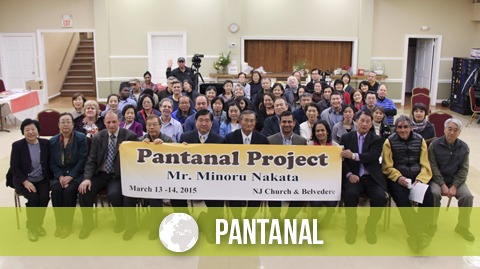Pantanal’s Leda Project Grows Toward Goal of Eradicating Hunger
The Leda Project, which was established by True Father in the Pantanal to help end world hunger, received a great honor recently when Mr. Minoru Nakata, a pioneer of the project, received a Peace Award from True Mother.
Upon Mr. Nakata’s return from Korea, he visited communities in New Jersey and New York to talk about the program. He was accompanied by Mr. James Nada, president of South and North America Sustainable Development for Peace, the organization that provides funding for the Leda Project. Mr. Nada spoke of True Father’s hope that the wealth of the United States could be used to support these kinds of projects, and he expressed his gratitude to the American Unificationists who recently donated a heavy-duty truck to the project.
The Leda Project was established by True Father in 1999 in the wetlands of the Pantanal, a region shared by the nations of Paraguay and Brazil. True Father envisioned that it would become a place that would help solve the worldwide problem of hunger.
A short documentary that was shown at the talks revealed the early investment into the project and all of the incredible developments since it began. Through the efforts of Japanese national messiahs, barren brushland was replaced by lecture and residence halls, orchards, and water treatment facilities. The video showed footage of the president of Paraguay visiting the site. The president rolled up his trousers to wade into the river and participate in the seeding of the waters with thousands of baby fish raised in the Leda fish farm.
Mr. John Gehring, director of Religious Youth Service, a project of the Universal Peace Federation that has worked closely with the Leda Project over the years, then introduced Mr. Nakata.
Mr. Nakata spoke of the challenges of establishing the project in its early days. He spoke humorously about the Scylla and Charybdis choice of either wrapping oneself in thick clothing and sweating profusely all day or of exposing one’s skin to the bites of the myriad of voracious mosquitoes that patrolled the wetlands. He noted with well-earned pride that his skin was now so tough after 10 years that he hardly noticed them anymore. Other external challenges were the venomous snakes, voracious piranha and prowling jaguars. He admitted, however, that the most difficult challenges were internal: the interpersonal relations of everyday interaction.
Mr. Nakata spoke of the teams of youth from many different nations—including Americans on RYS projects—who visited for a few weeks at a time and helped in the many different activities at Leda, such as building schools in the local communities.
Much of True Father’s vision for Leda involved the problem of world hunger and sustainable solutions. To this aim, a herd of 70 cattle was established at Leda, and by 2014 it had grown to 700, with 200 calves born that year.
A pig farm was also established, with the pigs roaming freely in the forest during the day. The ringing of a bell brought them all back into the farm for a ration of corn. One of the amusing sequences in the video presentation was the herd of hundreds rushing home in a squealing melee as Mr. Nakata cast handfuls of corn to reward them.
But the most successful project of all has been fish farming, which resonates with True Father’s vision of an aquatic solution to world hunger. With support from academics at Asuncion University in Paraguay’s capital, who provided theoretical guidance, the project eventually encompassed the complete life-cycle of the pacu, a major fish in the Paraguay River—starting with the harvesting of eggs, raising the hatchlings, and feeding them until they reached a mature 5 pounds in weight for sale to the local markets.
Leda’s fish farm has now become part of the important job of restocking the Paraguay River. Through the academic contacts, the government became aware of this project and the national president, who is very interested in sustainable development, decided to visit and participate in the hatchling release. The video presentation ended with him rolling up his trousers and emptying bags of small fish into the river.
The presenters were proud to show the Leda Project from its humble beginnings and the successful fruition of the vision that True Father had hoped for. The developments of the project have been gaining attention and are poised to become an integral part of the economic and environmental future of the region. Mr. Nakata ended his presentation by encouraging American Unificationists to contribute to the project and even visit, in order to see it continue for generations to come.


Dale Garratt
| #
Wow… So happy that the seeds True Father planted in the Pantanal have been nourished so sincerely and borne such inspiring fruit! Can you tell me how to donate to the Project? Kamsa hamnida!
Reply
editorial
| #
You can donate to the Leda Project here: http://www.ledaproject.com/#!donate/ctzx
Reply
Youngsoon
| #
This is Great! Hope to hear and see more of this in the future. Thanks!
Reply